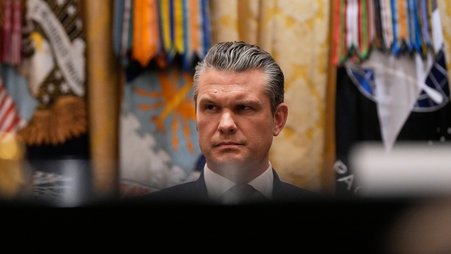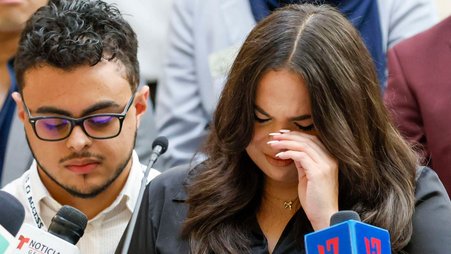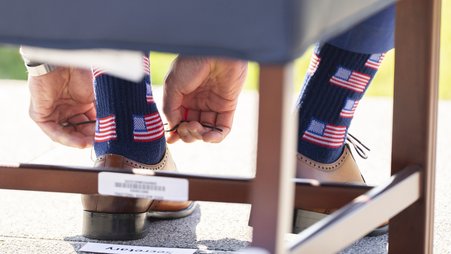A couple of years ago, a judge in Arizona issued a restraining order against journalist Camryn Sanchez at the behest of a state senator, Wendy Rogers. The ordeal was alarming, but press freedom advocates were able to breathe a sigh of relief when the order was struck down by another judge a few weeks later. That Rogers is, well, out of her mind, made it easier to hope that the whole thing was an isolated incident.
Unfortunately, that doesn’t appear to be the case. A Maryland journalist, Will Fries, was recently served with a “peace order” that would’ve barred him from city hall in Salisbury. The order, requested by the city’s communications director (allegedly in coordination with higher-ups), followed Fries’ reporting on the city’s purported policy requiring media inquiries to be routed through its communications office — which officials cited to restrict Fries from asking questions during a committee meeting.
Fortunately, a judge ultimately declined to issue the order. But after the Arizona restraining order and plenty of other instances of local officials claiming bizarre grounds to punish routine newsgathering, it would be a mistake to dismiss Fries’ case as a one-off.
We talked to Fries about the experience via email. Our conversation is below.
Tell us briefly about your background and the kind of reporting you do for The Watershed Observer.
For over a decade, I’ve worked to counter disinformation and malign influence across communities. I’ve done investigative work for nonprofits and tech companies, served on major presidential campaigns, and overseen digital strategy for former Portland (Oregon) Mayor Ted Wheeler (where things got interesting). Most recently, I launched The Watershed Observer to provide communities with faithful reporting at the intersection of local and global issues.
We want to talk about the “peace order,” or restraining order, that a government employee sought against you in Salisbury, but it looks like there’s a bit of press freedom “Inception” going on — that ordeal arose from your reporting on another press freedom issue. What happened on August 6 in Salisbury, Maryland?
Salisbury’s Mayor’s Office claimed the Human Rights Advisory Committee advised him to remove a rainbow crosswalk. In reality, the committee had voted against that and gone on public record disputing the mayor’s communications. I received reports, tips, and outreach, and I reviewed the committee’s approved May meeting minutes.
As a courtesy, I let the committee know ahead of time that I planned to take part in the open, public forum section of their August 6 meeting. After being recognized, when I raised questions about the mayor’s false statement, the mayor’s liaison blocked both me and the committee from discussion, falsely claiming a city policy barred journalists from participating. No such policy exists. Later, the mayor’s comms director sent an email exclusively targeting the Human Rights Committee and their ability to speak with the press and public about their public work, the same group that had raised concerns about the mayor’s misinformation.
The kind of policy that the mayoral staffer cited, that city employees are required to route all media inquiries to a communications office, has been referred to as “censorship by PIO,” or public information officer, because of how it limits the information obtainable by journalists. They’ve repeatedly been held unconstitutional. Putting aside that the commission members weren’t actually city employees subject to the policy — and that even if a city policy could restrict employees from answering certain questions, it certainly can’t block reporters from asking them — how have you observed these policies impacting the press?
The city’s actions had a tangible chilling effect. After the comms director’s email, some committee members hesitated to go on record, while others only spoke confidentially. In practice, this limited the committee’s ability to speak publicly about human rights issues or potential concerns regarding the mayor and his staff.
Will Fries“If someone is a nongovernment actor who produces media to be consumed by the public, they are press. The idea of official versus unofficial press is a ridiculous invention.”
I say actions, not policy, because there is no legitimate city policy banning journalists from participating in public meetings, and such a rule would serve no legitimate purpose. The false claim and creation of policy was fabricated in the moment to intimidate and coerce members of the public body, and me, in order to suppress participation in further discussing the mayor’s office’s gross misrepresentation of the committee’s public work. Its only purpose was to block accountability and prevent scrutiny.
I noticed in some correspondence, the comms director seems to refer to you as someone who claims to be a member of the media, and distinguishes between what she sees as official and unofficial press. As an independent journalist, how do you think city officials should determine who is or isn’t really the press? Or should they at all?
If someone is a nongovernment actor who produces media to be consumed by the public, they are press. The idea of “official” versus “unofficial” press is a ridiculous invention, completely at odds with constitutional protections and civic norms. The city of Salisbury has no legitimate policy distinguishing “real” from “not real” press, nor could it. That notion exists only to imply the city can ignore questions or accountability from anyone they don’t consider “official press.” They can’t. In Maryland, our Declaration of Rights explicitly extends the freedom of the press to “every citizen,” and many states have similar protections.
Talk about the follow-up reporting you did, or tried to do, after the August 6 meeting.
After the August 6 meeting, I did what any responsible journalist would do: I followed up. I gave the city employee a chance to clarify. I reached out to the mayor’s comms director for confirmation and comment. I also shared my reporting with the committee, inviting them to add their perspectives. Instead of engaging, the comms director issued an email exclusively to the Human Rights Advisory Committee, discouraging members from speaking to the press or the public. They spread falsehoods about me and my reporting in retaliation, rather than investigate the reality themselves or address the underlying facts of the mayor’s misinformation about the Human Rights Committee and mayor’s staff improperly interfering at the August 6 meeting. I also filed public records requests to learn more about the city’s processes and policies.
Then you got the peace order from the mayor’s comms director. Which allegations in the peace order application do you contend were factually false, and did the city ever present any evidence that those allegations were, in fact, true?
The comms director falsely claimed I was behind a nonthreatening and fact-forward whistleblower email that raised serious ethical concerns about her conduct, and petitioned that this, combined with my public records requests, somehow were grounds for a peace order. Those allegations were unfounded, baseless, and unsupported by any evidence. The petition functioned solely as retaliation against protected activities and now fits into an observable pattern of the city disregarding realities.
I’ve had a long investigatory career, and I am aware of other instances where peace orders have been misused as tools to discredit reporters and witnesses, or to intimidate people participating in serious investigations. At the same time, it’s important for everyone to recognize that lawful peace orders serve an important and serious purpose: They protect individuals from genuine threats and ensure safety in difficult circumstances. I believe that misuse and abuse of peace orders is rare.
So stripping away the allegations you dispute, what’s left is essentially that you sought comment for stories from the comms director, filed public records requests, and voiced your displeasure with how officials had characterized your reporting. That all sounds like routine journalistic conduct (especially when city policy doesn’t allow you to talk to anyone else besides the comms director) and a pretty open-and-shut case. Was it easy to get this thrown out?
Once all false statements and disprovable allegations are removed, what remains is professional conduct and routine journalism: seeking comment, filing records requests, and following up on city actions, activities documented by journalists every day. It’s concerning that it went as far as a court proceeding, but the judge ultimately ruled there was no basis for the petition.
Do you think higher-ups at the city had anything to do with the effort to obtain a peace order against you, which, incidentally, would have restricted you from entering city headquarters?
During sworn testimony, the mayor’s comms director acknowledged she pursued the peace order with encouragement and guidance from the city solicitor’s office and the Police Department. If that testimony were false, it would amount to perjury. In addition, I have received reports from trusted sources that an elected official may have personally participated. All of this indicates the effort wasn’t an isolated action by one employee, but part of a broader institutional attempt to retaliate against a reporter and restrict reporting access.
The U.S. Press Freedom Tracker, a project of Freedom of the Press Foundation (FPF), only has one case documented in which a judge knowingly entered a restraining order against a journalist (the Tracker is not documenting your case because the court declined to issue the order). That case involved a state senator in Arizona who objected to a reporter knocking on her door, and the order was later overturned. But there have been plenty of cases involving reporters being arrested, ticketed, investigated, sued, raided, or criminally charged over routine journalism. How do you think what happened to you fits into this broader national trend of local authorities retaliating against the press for doing its job?
We are seeing instances in which some people with public responsibilities respond to journalists with resistance or retaliation rather than openness. These actions rarely arise from legitimate concern and more often reflect institutional reluctance to confront reality or uphold accountability. In some cases, public officials entrusted with serving their communities treat engagement and transparency as risks rather than obligations. The healthiest communities are built on leaders who stay open, accountable, and ready to face tough questions from the public and the press.
Everyone has a responsibility to support press freedom, including journalists, city employees, and members of the public. Sometimes that responsibility is as simple as subscribing to a news outlet. Other times, it involves asking hard questions and sharing difficult truths with the public. And in some cases, it requires taking personal risks, including facing arrest or accusations, to advance public interests.
In this climate, we all have a responsibility to ask ourselves the hard questions about what we each can do to strengthen a free and transparent society.





